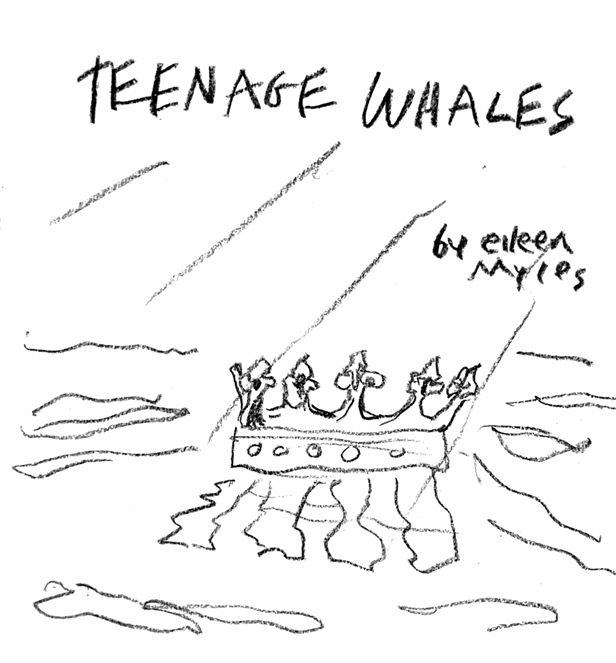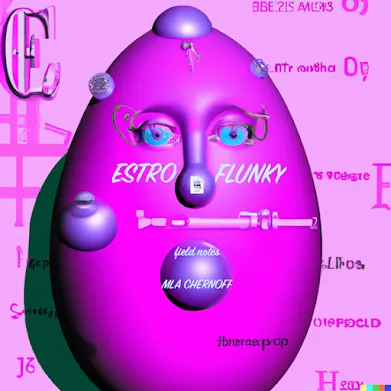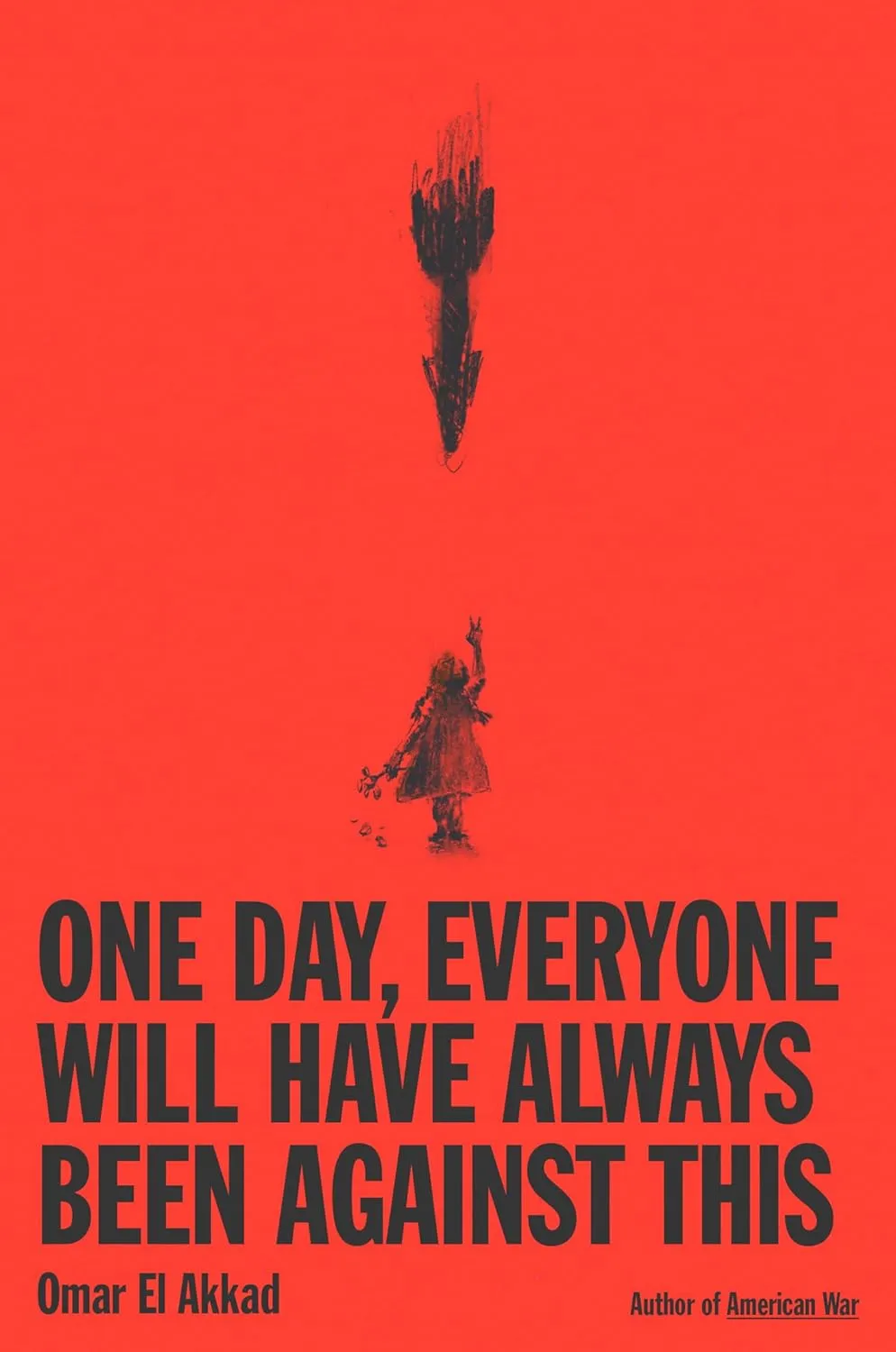Eileen Myles, Teenage Whales
Eileen Myles is not one to pass up a double entendre as a segue.

Let’s talk about Eileen Myles. Teenage Whales was published in March, 2025 by rob mclennan’s above/ground press.
It is a chapbook of poems, the cover printed on off-buff colour paper, with a charcoal drawing of what appears to be a crown with royal jewels in it floating upon a body of water with the moonlight falling upon it. Myles illustrated it themself.
The text of the chap appears to be written in a typeface akin to Lucida Console, one of my favourite fonts. Although it might not be that specific one, the intended effect is perhaps the same overall, appearing to have been produced by a typewriter, perhaps for a telegram, or on a CRT monitor with a Pentium 4 machine bearing a similarly coloured case, hypothetically speaking.
Eileen Myles is a journalist and poet living in two places, New York City and Marfa, Texas. They have published more than twenty volumes of poetry, fiction, non-fiction, and theatre according to Wikipedia. This is the first time I’m reading anything by them.
I read the first lines before reading any of their bio and knew it had to be the chap I reviewed tonight.
The whole chap is the titular poem, Teenage Whales, which I will excerpt up until the first ellipses (which they space out extra between the second and third dot, impossible for me to reproduce here at this moment in time):
the birds
push
the diamonds
the reddish
weave
of my knee
Honey’s heh heh
that shakes
her belly &
her back
it catches
in the back
of her
throat
ma-ma
goes the child
we want
to go
what the fuck
are you
doing here
with your
children &
a black
duck dips
his head
behind
a wave
is gone
I naming shit
ripe crest
darkening
as it goes
thun-dar
goes a plane
then mumble
grumble
I cld
go down
& say hello
yesterday
when I was
so morose
they were
making me
glad
now the tip
like a dick
like a clit
speaks tiny
shadows
pouring
in the sun
This middle section specifically tells so much of the story unfolding in these opening lines: “ma-ma / goes the child / we want / to go / what the fuck / are you / doing here / with your / children & / a black / duck dips / his head / behind / a wave / is gone / I naming shit / ripe crest / darkening / as it goes / thun-dar / goes a plane / then mumble / grumble”
So is the voice of the poem the teenage whale, the ma-ma the child speaks to? The whale is cussed out by the black duck but too self-aware to pay him any heed, admitting slash self-referring “I naming shit” before launching into an onomatopoeia of natural phenomenon, the wave crest ripening, darkening, which then melds into a plane overhead thun-darring, then mumbling, grumbling.
It is very telegrammatic. It is very sound-oriented logic. It tells a story, it presents parable-like animal characters, it has dirty words, it has imagery. It has a lot going on for an opening page.
So much is happening it’s hard to quite tell what the point is, but perhaps the point is disorientation:
will event
ually
tell me
about Patrice
Lumumba.
did he
pass bad
checks
probably not
that poet
is the
CIA
can’t
I arrange
anything
that supports
empire
this beach
touched
the shore
of Mozambique
Anthony
Bourdain
went
there & ate
This is Myles’ second mention of Patrice Lumumba in the poem, the first prime minister of the Democratic Republic of Congo, assassinated in 1961 after being forced out of office.
Stuart A. Reid put a book out with Knopf in October 2023 called The Lumumba Plot: The Secret History of the CIA and a Cold War Assassination covered in The New Yorker the month of its publication. Isaac Chotiner for The New Yorker goes on to describe it as a book explaining how Congolese independence was never given a chance.
I was following current events in Congo for about 3 weeks in April 2024, reading the news about it every day. Cobalt, cholera, control.
Just last month, the agreement signed yesterday by the DRC and Rwanda, was just starting out in the form of peace talks. There was no mention of US-led economic involvement a month ago.
So circling back to Lumumba, it doesn’t exactly inspire confidence for a long-lasting ceasefire, when ostensibly, the US is waging a diplomatic warpath to seize mineral resources in every country imaginable, including Canada and Ukraine, by any means necessary.
Even Chotiner in his review of Reid’s book on the CIA topic mentions “the geopolitics of the era were by no means straightforward.” He goes on to narrate:
By August of 1960, the White House, galvanized by Lumumba’s turn to the Soviets, had authorized a secret C.I.A. scheme to “replace the Lumumba Government by constitutional means,” whatever that meant. The same month, at a Cabinet meeting, Eisenhower made comments that some interpreted as a call for assassination. (Lumumba, Reid notes, “offended his sense of decorum.”) C.I.A.-sponsored protests started disrupting Lumumba’s speeches, and then the agency began scheming to kill him.
[...]
The question that Reid leaves mostly unanswered is what a different policy might have looked like. What if Eisenhower had shown the foresight that he displayed during the Suez crisis? Lumumba’s death occurred three days before the Kennedy Administration took power, but the hope of a substantial shift by a Democratic Administration proved futile. Within three years, the United States had taken over from the French in Vietnam, and went on to fight its own decade-long war there. As has often been said, the habitual error of the United States during this period was to view nationalist struggles for independence through the lens of anti-Communism, and to turn people who might have been allies (Ho Chi Minh is typically cited) into enemies.
So this critical parsing of history sort of becomes a passing context clue for the meat and potatoes of this line in Myles:
CIA
can’t
I arrange
anything
that supports
empire
The follow-up immediately down below of celebrity chef Anthony Bourdain, then, paints a scene the dizzying depth of confusion we find ourselves in within the greater context of the last half century of Western imperialism, American exceptionalism, and red scare.
Of course Anthony Bourdain fucking ate in Mozambique. I can hear his voice intoning the country’s name as I write, the imperialism of it rank in my ear, though imagined. This is Eileen Myles in full effect.
The between-the-lines commentary borders on risible, if you’re a fan of dark humour, and is such a deep cut as to show even the shadow in the wound.
The wordplay of “can’t I arrange” riffing off the letters in C.I.A. immediately beforehand is the neat little bow tying this package of verse together. It’s not Eileen Myles who is patently absurd, it’s the state of affairs that they versify, that we find ourselves in.
Taken as a whole, Teenage Whale reads like a telegram presaging the rapture (or rupture) of late-stage capitalism.
Then the title of the poem comes into focus shortly after:
In a jail
in Scotland
I learned
the young
whales
have fashions
the teenagers
all like
to swim
around
with a
dead fish
on top
of their
head
what a lark
It recalls a recent headline that orcas were spotted off the coast of Washington appearing to wear dead salmon as hats. In the orca world, this is their equivalent to a meme.
Eileen Myles is not one to pass up a double entendre as a segue. And in true Rimbaldian fashion, they continue the next page over literalizing the off-hand remark of a lark into an actual bird.
This work is no less discombobulating than the poetry chapbook I reviewed yesterday. Through Eileen Myles’ astringent lean, severe tone and stark zoological metaphors, however, I find solace. An olive branch for understanding this surrealist farce we call the real world.
We are living in truly fucky times, to quote a recent episode of the Ologies podcast.
Eileen Myles seems to have the edge to perfectly bottle it into this poem and they make quite a wry statement in the process, that results in impact more implicit than tacit, even when you have to read between the lines. I can’t wait to read them again. Thanks for reading.
Bibelotages Newsletter
Join the newsletter to receive the latest updates in your inbox.



